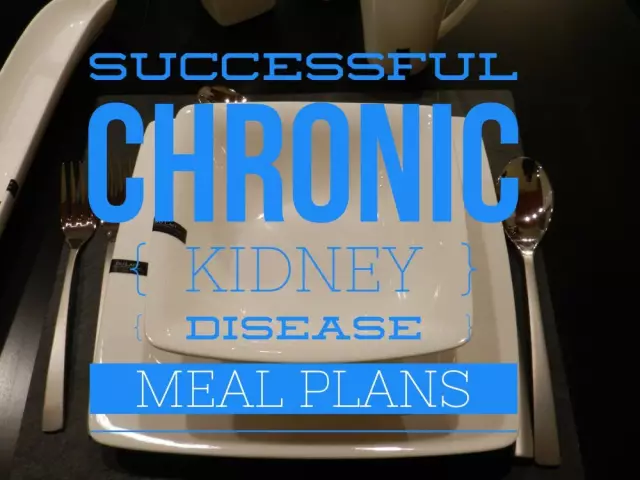- Author Rachel Wainwright wainwright@abchealthonline.com.
- Public 2023-12-15 07:39.
- Last modified 2025-11-02 20:14.
Kidney infarction - what is it?
The content of the article:
- The main causes and forms of the disease
- Kidney infarction symptoms
- Diagnostics
- Treatment tactics
- Prevention measures and prognosis
- Video
Kidney infarction is a variant of ischemic kidney disease that develops against the background of a sudden and complete cessation of blood flow through the renal artery. In the case of partial preservation of blood flow or a slow increase in occlusion, other pathologies develop (chronic renal failure, renovascular hypertension, etc.). Isolated disease rarely occurs, usually it is a complication of other pathologies (usually of the cardiovascular system).

Symptoms of extensive renal infarction resemble renal colic
Some patients do not seek medical help due to the mild severity of clinical signs, therefore, there are no accurate statistics on the infarction of kidney tissues. Meanwhile, timely diagnosis and the appointment of adequate treatment are of no small importance, which reduces the risk of adverse consequences.
The main causes and forms of the disease
Acute disturbance of the blood supply to the kidney is usually caused by arterial embolism or thrombosis. The source of emboli is most often a parietal thrombus of the left ventricle or atrium. In addition, a risk factor is the presence of atherosclerosis, atrial fibrillation, infective endocarditis, periarteritis nodosa, myocardial infarction, mitral heart disease. The cause of ischemic (anemic) infarction may be surgery on the renal artery, medical and diagnostic renal arteriography, etc.
In the overwhelming majority of cases, a kidney tissue infarction is recorded in elderly people with metabolic disorders.
Depending on the etiological factor, renal infarction is:
- ischemic;
- hemorrhagic;
- combined;
- uric acid.
In most cases, the pathology is ischemic in nature against the background of embolism of the major renal vessels.
There are other differences that can be seen in microslides and macros.
Kidney infarction symptoms
The manifestations of the disease depend on the extent of the organ damage. With a minor heart attack, there are usually no clinical signs of pathology. With a more extensive lesion, the description of the symptoms resembles renal colic: patients complain of sharp pain in the lumbar region, an increase in body temperature to subfebrile values, chills, a decrease in the amount of urine, nausea, and vomiting. An impurity of blood in the urine is detected, blood pressure may increase. In patients with disseminated intravascular coagulation syndrome, multiple foci of necrosis develop in the kidney tissue.
Diagnostics
The main diagnostic method of renal infarction is ultrasound, which makes it possible to assess the condition of the kidneys themselves and renal vessels. For the purpose of clarification, angiography, cystoscopy (to determine the side of the lesion, differentiation with glomerulonephritis), magnetic resonance and / or computed tomography, coagulogram (to assess hemocoagulation), general blood and urine analysis, biochemical blood test are performed.
Differential diagnosis is carried out with renal colic, dissection of the aortic aneurysm, glomerulonephritis.
Treatment tactics
Patients with suspected renal infarction require urgent hospitalization. Patients (especially in the presence of hematuria) are shown strict bed rest.
In a hospital setting, narcotic analgesic drugs are prescribed to relieve pain. Disorders of the blood coagulation system are corrected by taking direct anticoagulants. In the absence of hematuria, thrombolytics are prescribed, and if hematuria is present, hemostatic agents.

For renal infarction, bed rest is indicated
In the early stages, it is possible to restore blood flow by surgical removal of a thrombus or embolus. In the future, angioplasty may be required. In the presence of profuse hematuria, arterial hypertension, which do not respond or do not respond well to conservative therapy, as well as with total organ infarction, they resort to nephrectomy.
After a heart attack of the kidney tissues, in some cases, a long-term (often lifelong) intake of antiplatelet agents is indicated.
Prevention measures and prognosis
To prevent the development of a kidney tissue infarction, it is necessary to timely treat diseases that can lead to it, as well as a healthier lifestyle - proper nutrition, giving up bad habits, increasing stress resistance.
The prognosis depends on the extent of the organ damage. If the effect of the etiological factor persists, relapses are not excluded.
Video
We offer for viewing a video on the topic of the article.

Anna Aksenova Medical journalist About the author
Education: 2004-2007 "First Kiev Medical College" specialty "Laboratory Diagnostics".
The information is generalized and provided for informational purposes only. At the first sign of illness, see your doctor. Self-medication is hazardous to health!






